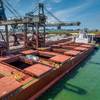Baltic Dry Index (BDI), which tracks the cost of shipping iron ore, coal, grain and other materials, is continuing to remain weak as Chinese imports of commodities especially iron ore and coal has gone down portraying dark futures for seaborne trade.
The Index, seen as an efficient economic indicator of future economic growth and production as dry bulk primarily consists of materials that function as raw material inputs to the production of intermediate or finished goods, is delivering much the same message about the global economy as a wave-skimming albatross.
On March 11 2015, the Baltic Dry Index slipped further to 565 points as capsize index lost 29 points to flat at USD 4357 spot time charter rate down by 79% YoY.
While a few ship owners are optimistic about a quicker recovery, AK Gupta, Chairman and Managing Director of Shipping Corporation of India, strikes a more realistic note. “The (dry bulk) market is in shambles. I do not think there will be any meaningful recovery before two years,” he told an Indian newspaper BusinessLine.
According to a report in the Economist, China absorbs three-fifths of the world’s ship-borne iron ore—the most commonly carried dry-bulk cargo—and a quarter of its coal. Yet this alone does not seem to justify a two-thirds fall in the BDI over the past year. Clarksons, a shipbroker, still expects Chinese imports of iron ore to grow by 7.5% this year.
Ship owners reckoned that China’s appetite for coal would keep growing. But the country’s policy of weaning itself off dirty energy has contributed to a rapid decline in imports, leaving another glut of new vessels and rock-bottom rates for their owners.
Cargo rates have foundered along with the share prices of shipping firms mainly because the growth of capacity has run ahead of the growth in demand. Some firms have sunk completely. Copenship, a Danish ship operator, went bust in February. Last year the bankruptcy of Genco Shipping was one of the largest in America.
The industry is suffering a flashback to what happened around the time of the global financial crisis. Globally, shipping companies are trying different methods to reduce current exposure to bulk markets. One trend has been that ship owners, who placed orders for new bulk carriers, are trying to convert these ships mid-way during construction into tankers, which are commanding better freight rates.













